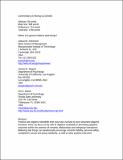| dc.contributor.author | Ackerman, Joshua | |
| dc.contributor.author | Shapiro, Jenessa R. | |
| dc.contributor.author | Maner, Jon K. | |
| dc.date.accessioned | 2011-09-22T13:13:07Z | |
| dc.date.available | 2011-09-22T13:13:07Z | |
| dc.date.issued | 2010-01 | |
| dc.identifier.uri | http://hdl.handle.net/1721.1/65926 | |
| dc.description | Open Peer Commentary | en_US |
| dc.description.abstract | Positive and negative misbeliefs both may have evolved to serve important adaptive functions. Here, we focus on the role of negative misbeliefs in promoting adaptive outcomes within the contexts of romantic relationships and intergroup interactions. Believing bad things can paradoxically encourage romantic fidelity, personal safety, competitive success, and group solidarity, among other positive outcomes. The evolution of misbelief Ryan T. McKay and Daniel C. Dennett Institute for Empirical Research in Economics, University of Zurich, Zurich 8006, Switzerland; and Centre for Anthropology and Mind, University of Oxford, Oxford OX2 6PE, United Kingdom ryantmckay@mac.com http://homepage.mac.com/ryantmckay/; The Center for Cognitive Studies, Tufts University, Medford, MA 02155-7059 ddennett@tufts.edu http://ase.tufts.edu/cogstud/incbios/dennettd/dennettd.htm | en_US |
| dc.language.iso | en_US | |
| dc.publisher | Cambridge University Press | en_US |
| dc.relation.isversionof | http://dx.doi.org/10.1017/s0140525x09991142 | en_US |
| dc.rights | Creative Commons Attribution-Noncommercial-Share Alike 3.0 | en_US |
| dc.rights.uri | http://creativecommons.org/licenses/by-nc-sa/3.0/ | en_US |
| dc.source | Prof. Ackerman via Alex Caracuzzo | en_US |
| dc.title | When is it good to believe bad things? | en_US |
| dc.type | Article | en_US |
| dc.identifier.citation | Ackerman, Joshua M., Jenessa R. Shapiro, and Jon K. Maner. “When Is It Good to Believe Bad Things?” Behavioral and Brain Sciences 32.06 (2010) : 510. | en_US |
| dc.contributor.department | Sloan School of Management | en_US |
| dc.contributor.approver | Ackerman, Joshua | |
| dc.contributor.mitauthor | Ackerman, Joshua | |
| dc.relation.journal | Behavioral and Brain Sciences | en_US |
| dc.eprint.version | Author's final manuscript | en_US |
| dc.type.uri | http://purl.org/eprint/type/JournalArticle | en_US |
| dspace.orderedauthors | Ackerman, Joshua M.; Shapiro, Jenessa R.; Maner, Jon K. | en |
| mit.license | OPEN_ACCESS_POLICY | en_US |
| mit.metadata.status | Complete | |
